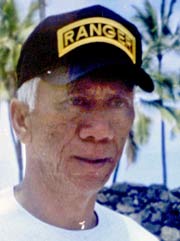State court to hear lawsuit
over men’s deaths in Iraq
RALEIGH, N.C. » A lawsuit accusing a North Carolina-based security contractor of wrongful death and fraud in the deaths of four guards killed and mutilated in Iraq -- including one from Hawaii -- should be heard in a North Carolina court, a federal judge has ruled.
![]()

![]()
Wesley Batalona: The Hawaii man and three others were killed guarding a food convoy
The brutal slayings of Wesley Batalona, 48, a former Army Ranger from the Paauilo on the Big Island; Stephen Helvenston; Mike Teague; and Jerko Gerald Zovko on March 31, 2004, made worldwide headlines. Frenzied crowds dragged their charred bodies through the streets of Fallujah and strung two of them up from a bridge.
The guards' families sued the company in state court in January, alleging Blackwater cut corners that led to the men's deaths. The workers were sent into Fallujah without proper equipment and personnel to defend the supply convoy they were guarding, the lawsuit said.
The company, based in Moyock, quickly moved to have the case heard in federal court, and then dismissed.
Blackwater argued the federal courts had jurisdiction in the case because of the Defense Base Act, a federal law limiting death benefits for contractors working overseas.
Company lawyers also argued that there was a "unique federal interest" in deciding the remedies available to contractors in war zones.
In a ruling issued Thursday, U.S. District Judge Louise Flanagan declined to move the lawsuit to federal court but agreed that the case raised "novel and complex" issues.
A spokesman for Blackwater did not return calls seeking comment yesterday.
A California-based attorney representing the estates of the four men said the federal law did not apply because the men were independent contractors, not Blackwater employees. The Defense Base Act also applies to negligent contact, while Blackwater's actions were intentional, said attorney Marc Miles in Santa Ana, Calif.
Blackwater "knew they were cutting corners, and they sent these gentlemen out without the needed tools, protection and information," Miles said. "This was not an accident."
The plaintiffs will be entitled to compensatory and punitive damages if they win their case in state court, Miles said.
The ruling and the case could set important precedents in U.S. courts. Miles said his firm believes the lawsuit was the first involving private U.S. contractors in Iraq, though others have since been filed.
Blackwater contracted with ESS Support Services Worldwide to guard food shipments to U.S. bases in Iraq. According to the lawsuit, the contract called for security teams to have two armored vehicles and a minimum of six people, as well as a heavy machine gun that could fire up to 850 rounds a minute.
The four men who died were sent out in unarmored vehicles, without the heavy machine gun and without a map and got lost, the lawsuit said. Having lacked time to become familiar with their weapons or routes around Fallujah, they went directly through the violent city.
The lawsuit claims Blackwater's failure to live up to the terms of the contract amounted to fraud.
No specific damages are listed in the suit, as is routine in North Carolina civil suits.
The men's estates are named as plaintiffs in the case. Their survivors live in Paauilo; Oceanside, Calif.; Leesburg, Fla.; Statesboro, Ga.; Clarksville, Tenn.; and Willoughby, Ohio.
E-mail to City Desk
[News] [Business] [Features] [Sports] [Editorial] [Do It Electric!]
[Classified Ads] [Search] [Subscribe] [Info] [Letter to Editor]
[Feedback]
